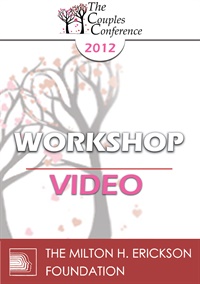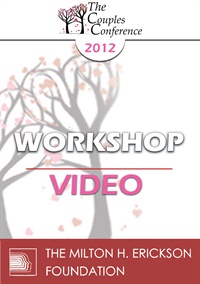- Average Rating:
- Not yet rated
- Topic Areas:
- IMAGO | Workshops | Communication | Couples Therapy
- Categories:
- Couples Conference | Couples Conference 2012
- Faculty:
- Harville Hendrix, PhD
- Course Levels:
- Master Degree or Higher in Health-Related Field
- Duration:
- 1:55:52
- Format:
- Audio and Video
- Original Program Date:
- Apr 28, 2012
- Short Description:
- Ever since Freud’s patient dubbed psychoanalysis a “talking cure,” most forms of therapy include someone talking to a professional. This workshop posits that therapy consists not so much in the action of talking but in the experience of how one is listened to while they talk, and that the more accurate name for successful therapy is the “listening cure.”
- Price:
-
Sale is $29.00
price reduced from Base Price - $59.00
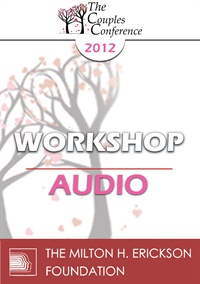
- Average Rating:
- Not yet rated
- Topic Areas:
- Couples Therapy | Workshops | Family Therapy
- Categories:
- Couples Conference | Couples Conference 2012
- Faculty:
- William Doherty, PhD
- Duration:
- 1:58:12
- Format:
- Audio Only
- Original Program Date:
- Apr 28, 2012
- Short Description:
- Remarried couples are often poorly served by therapists who treat them without enough appreciation for the unique complexity and multiple loyalties of stepfamily life. This workshop will combine clinical assessment and treatment issues with a special focus on values issues, such as commitment and fairness that often dominate conflict in stepfamilies.
- Price:
- $15.00 - Base Price
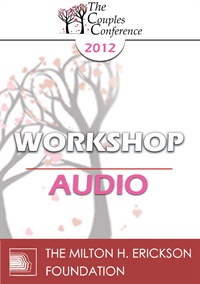
- Average Rating:
- Not yet rated
- Topic Areas:
- Workshops | Communication | Couples Therapy | Narcissism | Personality Disorders | Trauma
- Categories:
- Couples Conference | Couples Conference 2012
- Faculty:
- Ellyn Bader, PhD
- Duration:
- 1:01:18
- Format:
- Audio Only
- Original Program Date:
- Apr 28, 2012
- Short Description:
- Couples come to therapy saying “we can’t communicate.” It sounds simple. Yet what does this really mean? Closer examination often reveals trauma, chronic hostility, narcissistic entitlement, or long-term conflict avoidance. And resolution requires internal self-development that may be resisted by one or both partners. This advanced workshop will use video segments to demonstrate the intricacies of resolving predictable communication breakdowns and supporting couples development.
- Price:
- $15.00 - Base Price
- Average Rating:
- Not yet rated
- Topic Areas:
- Workshops | Love | Couples Therapy | Neurobiology
- Categories:
- Couples Conference | Couples Conference 2012
- Faculty:
- Helen E. Fisher, PhD
- Course Levels:
- Master Degree or Higher in Health-Related Field
- Duration:
- 1:35:03
- Format:
- Audio and Video
- Original Program Date:
- Apr 29, 2012
- Short Description:
- In her lecture, Fisher discusses four biologically based styles of thinking and behaving and, using her data on mate choice among 28,000 individuals, shows why we are chemically drawn to one person rather than another. In this workshop Fisher goes deeper into these natural temperament constellations, and discusses how partners with very different (and similar) biological styles of thinking and behaving interact to create great joy, confusion and sorrow in their partnerships.
- Price:
-
Sale is $29.00
price reduced from Base Price - $59.00
Tags: Love Couples Therapy Neurobiology
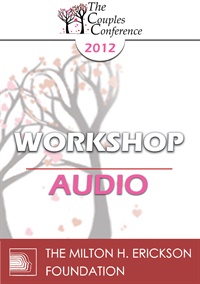
- Average Rating:
- Not yet rated
- Topic Areas:
- Emotionally Focused Therapy (EFT) | Workshops | Couples Therapy | Relationships | Therapeutic Relationship
- Categories:
- Couples Conference | Couples Conference 2012
- Faculty:
- Scott R. Woolley, PhD
- Duration:
- 1:26:46
- Format:
- Audio Only
- Original Program Date:
- Apr 29, 2012
- Short Description:
- Most couples have at least one partner who withdraws. To bring about lasting change, withdrawers have to engage in the process of therapy and most importantly they must reengage in the relationship. Using video examples, this workshop focuses on how to engage withdrawers and help them reengage with their partners.
- Price:
- $15.00 - Base Price
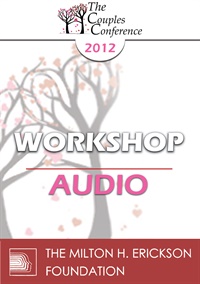
- Average Rating:
- Not yet rated
- Topic Areas:
- Workshops | Anger | Couples Therapy | Neurobiology
- Categories:
- Couples Conference | Couples Conference 2012
- Faculty:
- Rick Hanson, PhD
- Duration:
- 1:55:29
- Format:
- Audio Only
- Original Program Date:
- Apr 29, 2012
- Short Description:
- The first emotion our ancestors evolved was fear—and we remain highly threat reactive today, continually overestimating threats and underestimating opportunities and resources. We’ll explore multiple methods for helping clients “cool the fires” of fear and anger, and internalize inner strength and an appropriate sense of safety.
- Price:
- $15.00 - Base Price
Tags: Anger Couples Therapy Neurobiology
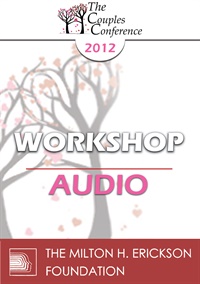
- Average Rating:
- Not yet rated
- Topic Areas:
- Workshops | Couples Therapy | Experiential Therapy
- Categories:
- Couples Conference | Couples Conference 2012
- Faculty:
- Rick Hanson, PhD
- Duration:
- 1:55:51
- Format:
- Audio Only
- Original Program Date:
- Apr 29, 2012
- Short Description:
- Building on the keynote on “taking in the good,” we’ll explore ways to use positive experiences to soothe and potentially replace negative material (e.g., relationship upsets, pain from childhood). Through discussion and experiential activities, we’ll match healing experiences to disturbances in the brain’s core motivational systems (Avoid harm, Approach reward, Attach to “us”).
- Price:
- $15.00 - Base Price
Tags: Couples Therapy Experiential

CC12 Workshop 14 – Focusing on Deficits in Couple Therapy: The PACT® Methodology – Stan Tatkin, PsyD
- Average Rating:
- Not yet rated
- Topic Areas:
- Workshops | Psychobiological Approach to Couples Therapy (PACT) | Couples Therapy
- Categories:
- Couples Conference | Couples Conference 2012
- Faculty:
- Stan Tatkin, PsyD, MFT
- Duration:
- 1:51:28
- Format:
- Audio Only
- Original Program Date:
- Apr 29, 2012
- Short Description:
- Deficits such as affect blindness, alexithymia, and poor theory of mind will likely lead to mutual dysregulation in couples during periods of distress or threat and is the driving force behind relationship dissatisfaction and dissolution. This workshop will introduce attendees to the most common social-emotional deficits and will demonstrate how to identify these deficits and what to do about them in couple therapy.
- Price:
- $15.00 - Base Price
Tags: Couples Therapy PACT
- Average Rating:
- Not yet rated
- Topic Areas:
- Workshops | Affairs | Couples Therapy | Attachment | Attunement | Conflict | Gottman Method
- Categories:
- Couples Conference | Couples Conference 2012
- Faculty:
- John Gottman, PhD
- Course Levels:
- Master Degree or Higher in Health-Related Field
- Duration:
- 1:47:47
- Format:
- Audio and Video
- Original Program Date:
- Apr 29, 2012
- Short Description:
- The Atone-Attune-Attach model of couples’ therapy for healing from a revealed extra-relationship affair, with secrecy deception is described. Each of the three phases has 4 objectives. The roles of conflict avoidance and self-disclosure avoidance are discussed, as well as the Gottman-Rapoport conflict blueprint. To deal with attachment injuries and regrettable past incidents, the Gottman Recovery Kit is described. The Gottman-Rusbult-Glass cascade forms the basic theory for this therapy. The roles of cherishing and gratitude versus trashing and betrayal are discussed, as well as the theory of attunement and trust, and CL-ALT and betrayal.
- Price:
-
Sale is $29.00
price reduced from Base Price - $59.00
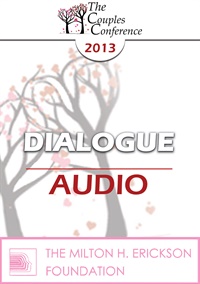
- Average Rating:
- Not yet rated
- Topic Areas:
- Sex and Sexuality | Dialogues | Couples Therapy
- Categories:
- Couples Conference | Couples Conference 2013
- Faculty:
- Lonnie Barbach, PhD | Marty Klein, PhD
- Duration:
- 1:00:40
- Format:
- Audio Only
- Original Program Date:
- Apr 20, 2013
- Short Description:
- CC13 Dialogue 01 – Sex Therapy – Lonnie Barbach and Marty Klein Educational Objectives: Given a topic, describe the differing approaches to psychotherapy, and identify the strength and weaknesses of each approach.
- Price:
- $15.00 - Base Price
Please wait ...


